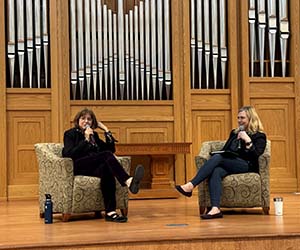Slay the ‘two-headed monster of racism and patriarchy’
WACO—Stories of God’s love toward marginalized women can help the church slay “the two-headed monster of racism and patriarchy” in its midst, a historical theologian and women’s advocate told a conference at Baylor University’s Truett Theological Seminary.
Jesus offered “an intentional welcome of outsiders” and treated women with a dignity society denied them, said Mimi Haddad, president and CEO of Christians for Biblical Equality International.
Haddad was a keynote speaker at the second day of a conference on Racism in the World Church, sponsored by Truett Seminary, with financial support provided by the Eula Mae and John Baugh Family Foundation and others.
From the Old Testament stories of Rahab and Ruth to the stories in the Gospels about Jesus’ encounters with women, the Bible presents pictures of God’s affirmation of women—including women from different ethnic groups, she noted.
‘Proximal to her suffering’
Jesus’ longest recorded conversation in the Gospels was with a Samaritan woman, and he praised the tested faith of a Syrophoenician woman who sought healing for her daughter.
While on the way to restore life to the daughter of a leader of a Jewish synagogue, Jesus’ healing ministry extended to an “unseen woman” with vaginal bleeding who dared to touch the hem of his garment, she observed.
“Two daughters were healed that day. The one without privilege was healed first,” Haddad said.
In each instance where he healed a woman, “Jesus was proximal to her suffering,” she added,
At Pentecost, “the Spirit birthed a new creation” marked not by circumcision but by baptism, Haddad observed.
“Baptism welcomes women. Circumcision excludes women,” she said.
Haddad pointed to the discovery of ancient baptismal fonts—made to resemble wombs as a synmbol of new birth—inscribed with the egalitarian words of Galatians 3;28: “There is no longer Jew or Greek, there is no longer slave or free, there is no longer male and female; for all of you are one in Christ Jesus.”
She also cited historical examples of Christian women who stood for oppressed and exploited girls—victims of trafficking, slavery and violence.
Need to confront ‘flawed theology’
Today, she challenged the church to confront “flawed theology” that “prioritizes one ethnic group over another” and reinforces patriarchy “that demeans girls and women.”
She particularly cited the “scandal of dispensational theology that fosters significant injustice” by valuing the lives of Jewish women and children above those of Palestinian women and children.
Haddad called on the church to lament its complicity in patriarchal and racist systems.
“Without collective lament, we speak peace where there is no peace,” she said.

In a public conversation with Baylor historian Beth Allison Barr, author of The Making of Biblical Womanhood, Haddad spoke about the importance of “recovering history”—particularly the stories of women of color from non-Western cultures.
The church benefits from “broadening the conversation” and learning the stories of fellow Christians outside their own traditions, countries, ethnic groups and cultures, she noted.
Haddad confessed she is “weary” of a view of Christianity that is focused exclusively on the United States and “white people obsessed with other white people.”